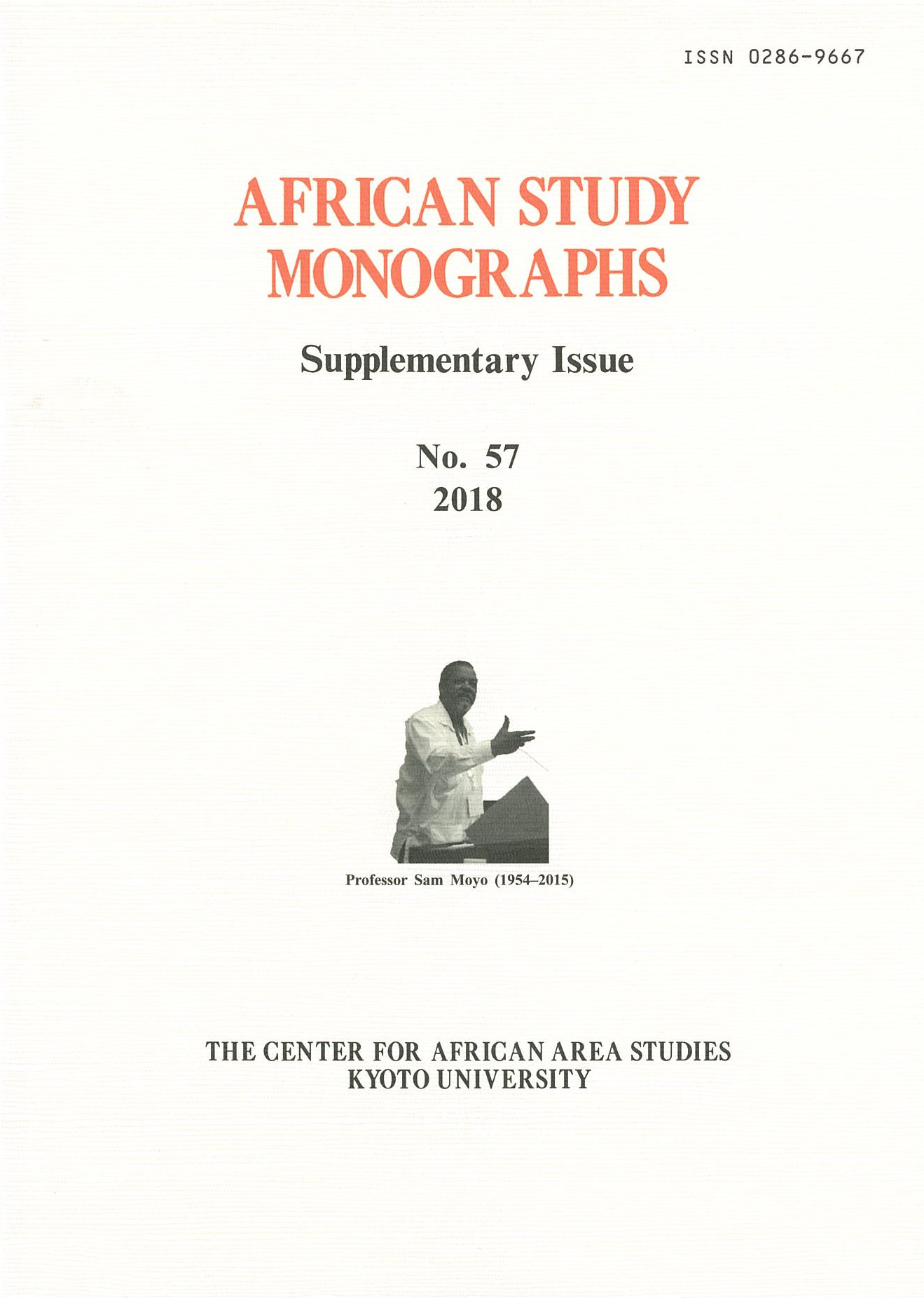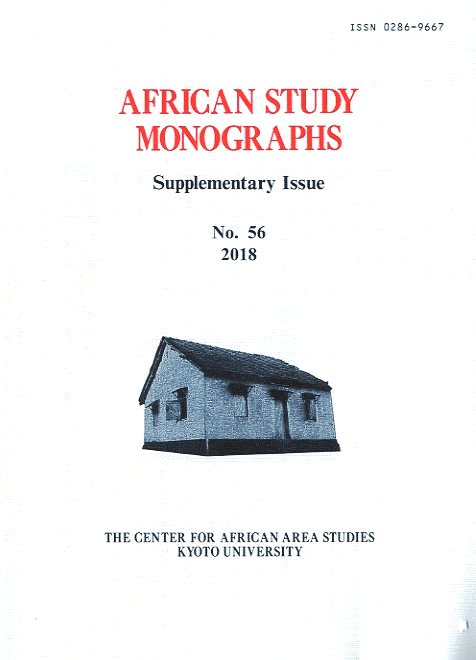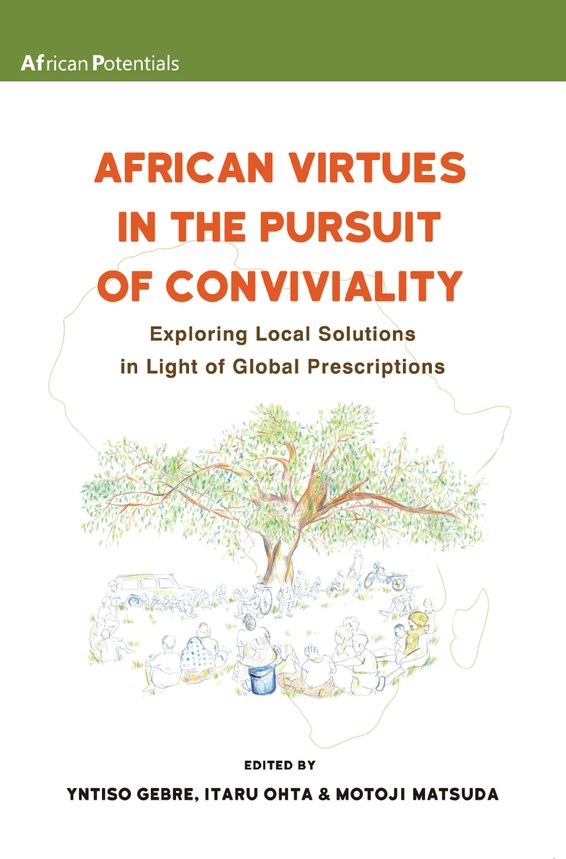[Research Team Meeting] 9th Meeting Gender and Sexuality Research Team (June 16, 2018)
Date: June 16, 2018
Venue: Room318 of Inamori Foundation Memorial Hall, Kyoto University
1.Members made a report on their oral presentations at the annual meetings of the Japan Society for African Studies, held at Hokkaido University on May 26-27.
2.Members shared the plan of oral presentations in a proposed panel, titled “Diversification and Reorganization of ‘Family’ and Kinship in Africa: Cross-cultural Analysis on Economic Discrepancy, Conflicts and Potential of Indigenous Institutions for Social Security” at the annual meeting of International Union of Anthropological and Ethnological Sciences (IUAES), which will be held on July 16-21, 2018.
[Networking Area Studies] The 35th Annual Meeting of Japanese Society for Oceanic Studies (March 23, 2018)
The 35th Annual Meeting of Japanese Society for Oceanic Studies
Joint Symposium with the “African Potentials” project and the Japanese Society for Oceanic Studies.
Title: “Local Responses to Conflicts and Coexistence: Case Studies from Oceania and Africa.”
Date and Time: 23rd March, 2018, Friday, 8:45 – 10:15
Venue: Event Hall, Okinawa Churaumi Aquarium, Ocean Expo Park.
- MC: Sachiko Kubota (Graduate School of Intercultural Studies, Kobe University)
- Daisuke Takekawa (Faculty of Humanities, University of Kitakyushu)
“Governance for Reconciliation in Island Communities: From a View Point of Universal Human Moral Foundation.” - Kaori Ootsuru (Graduate School of Social System Studies, University of Kitakyushu)
“Relationship Restoration Through Polyphonic Story Narrating: From Case Study in Vanuatu.” - Shuichi Oyama (Center for African Area Studies, Kyoto University)
“Attempt of Conflict Prevention by Agriculturists and Pastoralists in the Sahel Region in West Africa: With a Focus on Avoidance and Negotiation over Violent Conflicts Incurred by Crop Damaging.” - Toshihiro Abe (Faculty of Letters, Otani University)
“How Should the Reconciliation Policy in South Africa Be Evaluated?” - Daiji Kimura (Graduate School of Asian and African Area Studies, Kyoto University)
Comments
The Japanese Society for Oceanic Studies was established in 1977 to promote Oceanic Studies in Japan. The 35th Annual Meeting held in 2017 organized a joint symposium with “African Potentials” project to commemorate the 40th anniversary of the society.
Kubota explained the background of the symposium, which was jointly organized by the Grant-in-Aid for Scientific Research (S) “African Potential” (project leader, Motoji Matsuda) and Specific Research Project on “Community Governance on Retribution and Restoration over Conflict Resolution: From a Case Study on Dolphin Hunting and Environmental Organizations” (project leader, Daisuke Takekawa), and mentioned that the objective of the symposium is to address local responses on conflicts and coexistence in Oceania and Africa.
Takekawa firstly explained the meanings of the two keywords: mutual benefit, which is an emotion related to fairness and equity, and empathy, which is an action led by consideration of the others’ intention. Then he presented his observation on cases of conflict avoidance among clans by excessive gifting and reconciliation regarding suspension contract for dolphin hunting and embezzlement of contract amount by the agent. He elucidated that, in small communities, restorative justice based on empathy, in which they consider the counterpart shares the same feeling, is more important than retributive justice focusing on mutual benefits.
Ootsuru introduced a case from Erromango Island, Vanuatu, where Christian missionaries were killed in the 19th century. She took examples from the reconciliation ceremony held after 170 year of death of the missionaries and apology ceremony among the community members in the north and south which had been conflicting over the use of traditional songs and dance. Then she concluded that continuity of restoration and lasting consent have been realized in a circular connection (or loop) of interpretation of facts, storytelling, repeating empathy, reality, and narrative creation.
Oyama discussed a case of conflict in the Sahel region in West Africa where agriculturists and pastoralists face conflicts rooted in crop damage by the cattle. The victims and offenders do not confront each other directly and avoid escalation to violence. However, he clarified that conflict prevention based on dialogue at community level does not function for avoidance of deadly attacks and terrorist attacks led by Boko Haram.
Abe addressed reconciliation policy implemented in South Africa after democratization. Their initiatives aiming to unify the society through hearing of evidences and amnesty attracted various criticisms from political forces within the country, but the speaker considered that a turning point in collective conflicting relationship can be read in such affairs.
Kimura, the commentator, summarized the points of each presentation and then exemplified a case of marriage in the Bongando people in rainforest in Cameroon. He pointed out that maintaining and restoring relationships require continuous movement and emphasized continuity of the action, rather than the state. At the local level, they stress ambiguity and subjectivity, which have irreconcilable natures against modernity.
The general discussion addressed and confirmed various topics, including: whether any characteristics or tendencies in negotiation and conciliation within the community or external parties in Oceania and Africa; the significance of exploring compensation, gift, reconciliation, and ceremonies in a social context; and focusing on proactive initiatives by the local residents on conflicts and coexistence, and importance to clarify the undefined concept of reconciliation at the local level.
[Plenary Committee Meeting] 8th Plenary Committee Meeting: Team Leaders’ Meeting (March 3, 2018)
Date and Time: 14:00-17:00, March 3, 2018 (Saturday)
Venue: Middle Meeting Room, 3rd Floor, Inamori Foundation Memorial Hall, Kyoto University
(Honorifics and titles omitted hereafter)
This plenary meeting was organized as a team leaders’ meeting in which the leaders of the seven teams (including an acting leader), members in charge of general overview, and secretariat participated. Motoji Matsuda, the project leader, presented the following report and the team leaders responded with opinions and discussed the ways forward for the project.
1. International Communication
First, a report on international communication of research outcome was presented. The speaker reported the record international communication (European Conference on African Studies and African Studies Association in the US) in fiscal year 2017 and shared a plan for the communication in fiscal year 2018 (World Social Science Forum and International Union of Anthropological and Ethnological Science).
2. African Potentials Forum
A detailed report on the Africa Forum held in Grahamstown, South Africa, was presented. It also referred to the outcome of the forum. Following the report, the speaker explained that the selection of the keynote speaker and report presenters from Africa for the Africa Forum in the next fiscal year (December in Accra, Ghana) is in progress, and requested the leaders to list candidates for the presenters. In addition, he also referred to the publication of the outcome of the Kampala Forum 2016 (to be included in African Study Monographs Supplementary Issue 56).
Explanation on the symposium in Kyoto, scheduled in January 2019, was also provided. He explained the symposium will serve as an international exchange seminar mainly for young to mid-level researchers, and requested the leaders to consider candidate invitees from African young/mid-level researchers and candidate presenters from Japan.
3. Research Collaboration with Other Area Studies Groups
The speaker reported on collaborative research activity with other area studies group (Joint Symposium with Japanese Society for Oceanic Studies) implemented this fiscal year and shared a plan for future activity (collaboration with Japan Society for Southeast Asian Studies, May 2018).
4. Team Activities
The budget for the next fiscal year and schedule for the Plenary Meeting were announced, and direction of the project for the next fiscal year onwards was discussed. Prior to the discussion, Motoji Matsuda, the project leader, shared his thoughts on how to proceed with the project. In response to his requests, each team leader shared updates on team activities and commented on the ways forward for the project. The leaders discussed whether to continue the current approach based on individual reports or to start focusing and sharing discussions beyond the teams. They concluded to maintain the individual report approach for another year. On the other hand, they confirmed to encourage mutual exchange with other teams and collaborative activities by multiple teams.
(Reported by Shinichiro Ichino.)
[International Conference] 7th African Forum: Grahamstown (November 24–26, 2017)
AFRICAN FORUM

7th African Forum: Grahams town
Dates: November 24–26, 2017
Venue: Rhodes University, Grahamstown, South Africa
Summary of African Forum
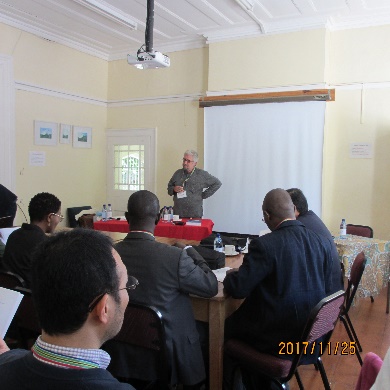
The 7th African Potentials Forum was held from November 24 to 26, 2017, in Grahamstown, South Africa. Project members, researchers, and practitioners from southern African countries, such as Angola, Botswana, and Mozambique, participated in the forum. The event also included a new component: a poster session for young researchers, which was incorporated to encourage a focus on academics in the next generation. Postgraduate students from Rhodes University, Cape Town University, and University of Lesotho took part in the forum. The more than 40 participants held intense discussions on African potentials during the two-day event.
This forum had two key characteristics. The first was its attempt to seek another mode of intelligence in humanities based on African potentials, which is one of the objectives of the second phase of the project. The discussion as such was centered around the idea of multiple universality proposed by Dr. Michael Neocosmos in his keynote speech. Universality has long been a concept exclusive to modern, Western societies up until now (as target of criticism or defense, but he discussed the possibility to find different ways to understand universality in politics, history, and views of humanity and society. The second characteristic of the forum was that more than a half of the presenters were female, and the event encouraged active discussion on sexual violence, sex governance, as well as gender and sexuality which were newly added to the project theme from the seceiond phase.
The forum offered a poster session and four sessions titled “Liberation,” “Knowledge,” “Governmentality,” and “Everyday Wisdom.” The event opened with Dr. Michael Neocosmos’s keynote address, “African Potentials and the Thought of Universal Humanity.” After the keynote, 14 presenters (seven from Africa and seven from Japan) made reports in breakout sessions, and core members of the project, who had been working to conceptualize African potentials since the first phase of the project, served as commentators to deepen and develop the discussions. At the poster session, seven researchers from the next generation presented on topics related to African potentials.
In the plenary discussion on the last day of the forum, we confirmed our shared understanding of the importance of the conception and practices of African potentials in a situation where many modes of intelligence represent colonial thinking. We must critique and identify issues in such outdated thinking and adopt countermeasures. At the same time, we confirmed the need to construct a new order of intelligence by mutually collaborating in and engaging with modern Western concepts and practices—rather than merely rejecting or criticizing them—to address social contradictions and the global trend toward violence in our world today. In addition, because of the participation of many young researchers, this forum promoted an open exchange of opinions on emerging generational gaps in recognition and behavior.
We have concluded that each party involved would consider publishing the outcome of the forum either in featured journal articles as a part of the African Potentials series in English.
(Motoji Matsuda, Project Leader)
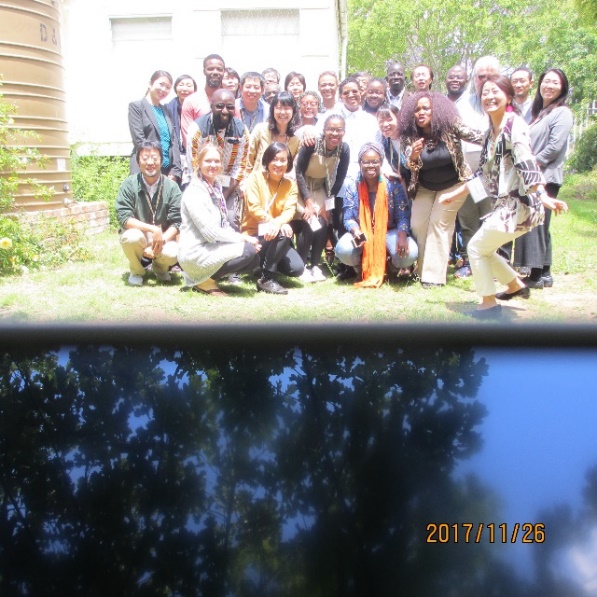
PROGRAM
Program Timetable
November 24, Friday
- 18:00-19:00 Registration
- 19:00-21:00 Reception
November 25, Saturday
- 9:40-10:00 Opening remarks
- Motoji Matsuda (Project leader, Kyoto University)
- 10:00-11:30 Keynote Address (Chair: Eisei Kurimoto)
- Michael Neocosmos (Rhodes University)
African Potentials and the Thought of Universal Humanity - 11:30-13:00 Lunch Break
- 13:00-15:30 Session 1: Liberation (Chair: Yohei Miyauchi)
Commentators: Edward Kirumira & Yoko Nagahara - 1-1. Shose Kessi (University of Cape Town)
African Identities and Community Participation in the Time of ‘Nation’ - 1-2. Toshihiro Abe (Otani University)
Reconsidering South African TRC in the Current Context of Transitional Justice Studies - 1-3. Nomboniso Gasa (University of Cape Town)
The Traditional Debate in South Africa: What Is the Fuss All About? - 1-4. Akiyo Aminaka (IDE-JETRO)
Signs of Spontaneous Democratization in Mozambique: Special Focus on the Opposition Party and Its Ex-Soldiers - 15:30-15:50 Coffee Break
- 15:50-17:50 Session 2: Knowledge (Chair: Shose Kessi)
Commentators: Michael Neocosmos & Motoji Matsuda - 2-1. Artwell Nhemachena (University of Namibia)
Evading Genetic Modifications through African Potentials? Whither the Afro-pessimism Thesis - 2-2. Akira Takada (Kyoto University)
The Medium of Instruction in North-Central Namibia in Colonial Times - 2-3. Sethunya Tshepho Mosime (University of Botswana)
Teaching African Potentials: Incompleteness and the Pedagogy of African Potentials - 18:30- Conference dinnerk
November 26, Sunday
- 9:00-11:00 Session 3: Governmentality (Chair: Nomboniso Gasa)
Commentators: Kennedy Mkutu & Eisei Kurimoto - 3-1. Richard Pithouse (Wits University)
Can the Subaltern Be Heard? Reflections on the Academy, the Universal and Thought from the Underside of Modernity - 3-2. Yohei Miyauchi (Rikkyo University)
Tolerance as Post-Apartheid Urban Planning Political Geography of the Art-Led Urban Rejuvenation in Inner City of Johannesburg - 3-3. Euclides Gonçalves (Kaleidoscopio)
Champion’s Music and the Poetics of Constructive Criticism in Rural Mozambique - 11:00-11:15 Coffee Break
- 11:15-12:15 Poster Session
- P-1. Levi Kabwato (Rhodes University)
Catching Colds: Analysing Media Discourses in Africa on Euro-American Political Developments - P-2. Motlatsi Khosi (University of South Africa)
“Living” Ubuntu: The African as Philosophy in Its Construction of an African Philosophy - P-3. Yvonne Zamaswazi Sibaya (University of Cape Town)
Downsizing and Outsourcing African Identities.
An Ethnography of the Downsizing and Outsourcing of African Identities through Transactional Hair Exchanges amongst Insiders and Outsiders of Johannesburg - P-4. Sayaka Kono (National University of Lesotho)
Making “Basotho of South Africa” under Bantustan Policy: Ethnicity, Citizenship and Apartheid in Rural South Africa in the Late 1970s: - P-5. Meyu Yamamoto (Tsuda University)
Beyond Binary Paradigm of Racism: Chinese Mine Labour and Construction of Whiteness in South Africa - P-6. Yuriko Sugiyama (University of Botswana)
Reorganization of San Society in New Xade, Botswana: Analysis of Changes in Funeral Customs - P-7. Chivimbiso Gava (University of Cape Town)
Migration and Narration – Making the Unfamiliar Familiar through a Shared History - 12:15-13:30 Lunch Break
- 13:30-15:30 Session 4: Everyday Wisdom (Chair: Akira Takada)
Commentators: Edward Kirumira & Toshio Meguro - 4-1. Mayu Hayakawa (National Museum of Ethnology)
The Potential of the Useless Money: The Non-Disappearance of Hyperinflating Currency in Zimbabwe - 4-2. Fezokuhle Mthonti (Rhodes University)
The Hair Salons Are Not Burning: African Migrant Women and Xenophobic Violence in South Africa - 4-3. Junko Maruyama (Tsuda University)
Divided Land, Shared Land: Recent Land Issues among the San Hunter-Gatherers in Central Kalahari - 15:30-15:45 Coffee Break
- 15:45-17:30 General Discussion (Chair: Eisei Kurimoto)
- 18:00- Farewell Party
[Plenary Committee Meeting] 6th Plenary Committee Meeting: “For the Rhodes Forum 2017” (October 14, 2017)
Date: October 14, 2017 14:00~17:00
Venue: 3rd floor of Inamori Foundation Memorial Hall, Kyoto University
At the beginning of the meeting, Motoji Matsuda, the project leader, made a number of administrative announcements, including in relation to international forums and conferences related to the project, events in which the project members participated, support for future research by next generation, publication of the ASM, as well as future plenary meetings. Shinichi Takeuchi provided a detailed explanation of the African Studies Association(ASA) Meeting.
Next, Motoji Matsuda provided an overview of the seventh Africa Forum (also called the Rhodes Forum), which is scheduled to be held from 24 to 26 November at Rhodes University in Grahamstown, South Africa. Five Japanese speakers are due to present at the forum. Their names and the titles and abstracts of their presentations are listed below.
Speaker 1: Toshihiro Abe (Otani University)
Title: Reconsidering South African TRC in the Current Context of Transitional Justice Studies
This presentation discussed how to re-evaluate the impact of the Truth and Reconciliation Commission (TRC) in South Africa, which completed its activities nearly 20 years ago, as well as what secondary impacts derived from them have attracted attention. The speaker then reconsidered the TRC in South Africa in comparison to a number of case studies of justice in transitional eras drawn from other regions, such as the former Yugoslavia. On the basis of these comparisons, the speaker suggested that the response of society in post-TRC South Africa has resulted from such conditions as “control of more than sufficient and intermediate omission”, “failure in specific nature” and “insufficiency and incompleteness in certain areas”.
Speaker2: Akira Takada (Kyoto University)
Title: The Medium of Instruction in North-Central Namibia in Colonial Times
In this presentation, the speaker reported the education history of the San people in the Ohangwena region, the Ovambo people in north-central Namibia, and non-white people in southern Africa, with a focus on the medium of instruction. The languages used for education in this region have changed in accordance with social and political changes, such as colonial policy, the activities of missionaries, and policies in relation to indigenous peoples. A range of languages, including English, Afrikaans, Spanish and Ovambo language, have been used. The speaker also highlighted the significant differences between the respective education histories of the San, Ovamboland’s indigenous inhabitants, and the Ovambo people.
Speaker 3: Mayu Hayakawa (National Museum of Ethnology)
Title: The Potentials of the Useless Money: The Non-disappearance of Hyperinflating Currency in Zimbabwe
This presentation attempts to find African potentials in the reaction of people in Zimbabwe to hyper-inflation. Inhabitants of Zimbabwe used Zimbabwean dollars as limited-purpose currency even under conditions of hyper-inflation. On the other hand, US dollars, which could have been regarded as multi-purpose currency, were sometimes not used due to a shortage of smaller bills. In such extraordinary circumstances, Zimbabweans attempted to maintain everyday life by means of natural and usual trades, which displays the presence of an economy and currency maintained by micro-management, which differs from the situation prevailing in most modern economies and currencies.
Speaker 4: Junko Maruyama (Tsuda University)
Title: Divided Land, Shared Land: Recent Land Issues among the San Hunter-gatherers in Central Kalahari
The San people, a group of hunter-gatherers in the Central Kalahari, have continued to be forced to settle outside their ancestral land. However, they have won national lawsuits after attracting international attention by appealing land issues as an indigenous movement. However, as a result, the government has permitted only a limited return to ancestral land for specified persons, and land rights accessible only by a small number of wealthy people. In short, land issues have been transformed into disparity issues among the San. However, the San now visit new land by utilizing their family networks, and have found new enjoyment in becoming familiar with the land, leading to an overall expansion of the San’s area of activity.
Speaker 5: Meyu Yamamoto (Kyoto University)
Title: Beyond Binary Paradigm of Racism: Chinese Mine Labour and Construction of Whiteness in South Africa
The speaker attempted to relativize the dichotomous view of racism based on “white” and “black” in South Africa, with the presence of annually contracted Chinese workers. In the early twentieth century, the United Kingdom introduced annual contract workers from China to the Rand Gold Mine. The workers spent six years in the country, laboring under poor conditions, before being returned to China, but the event gave rise to a widely held stereotype of Chinese people in South Africa and contributed to the rise of white nationalism. In other words, the introduction of Chinese workers and the existence of the Asia threat, which was known at the time, encouraged unity among the “white” population in South Africa, which had not previously been cohesive, and encouraged the construction of a “white South Africa”.
Misa Hirano-Nomoto / Shinichiro Ichino
[Plenary Committee Meeting / Public Lecture] 7th Plenary Committee Meeting / 3rd Public Lecture: The Food Connection Between African Villages and Japan: Can African Food-Producing Regions Change through Fair Trade? (January 27, 2018)
Date and Time: 14:30–17:30, January 27, 2018 (Saturday)
Venue: Large Meeting Room, Third Floor, Inamori Foundation Memorial Hall, Kyoto University
Program *Moderator (Motoki Takahashi, Kyoto University)
- Outline of Objectives (Motoji Matsuda, Kyoto University)
- Lecture 1: Fair Trade in Chocolate and its Effect on Production Regions (Akira Kondo, Ghana Project Manager, NPO ACE (Action against Child Exploitation))
- Lecture 2: Fair Trade in Coffee and Social Systems in Coffee-Producing Regions: Systems that Help and Systems that Hinder (Hideaki Tsujimura, Kyoto University)
- Commentator 1 (Motoi Suzuki, National Museum of Ethnology)
- Commentator 2 (Koichi Ikegami, Kindai University)
This general meeting was open to the public. It was a great success, with as many as 117 participants in attendance.
Professor Matsuda kicked off the workshop with an explanation of the objectives of this meeting. The goal of fair trade is to improve the lives of people in food-producing regions by correcting inequitable relationships between producers and consumers. In recent years this concept has become well known in Japan. So, what is the actual effect of fair trade on production regions?
In the first lecture, titled “Fair Trade in Chocolate and its Effect on Production Regions,” Mr Kondo, a member of the NPO ACE (Action against Child Exploitation), described its long history of projects in support of cacao producers in Ghana and its work with fair trade products. Mr Kondo also discussed the changes brought about in cacao plantation districts by ACE campaigns such as 1 more LOVE and 1 Chocolate for 1 smile, the latter in cooperation with the confectionary maker Morinaga & Co., Ltd.. ACE not only provides aid for cacao production, but also works to eliminate child labor and improve the educational environment, and has been progressively achieving these goals. The next challenge is to enable local farming villages to continue these activities after the project ends. Here, Mr Kondo presented examples of villages whose residents have voluntarily proposed and enacted mechanisms to monitor child labor and organizations to provide mutual aid. He also described the importance of the link between consumers and food-producing regions, for example, how letters from consumers in Japan led to increased motivation among local producers. Mr Kondo discussed how the fair trade initiatives taken by large corporations that produce chocolate have brought the concept of fair trade closer to Japanese consumers.
The next speaker, Professor Tsujimoto of Kyoto University, discussed the effect of international coffee market trends and the fair trade movement on coffee-producing regions in the foothills of Mt. Kilimanjaro in Tanzania, which he has spent many years researching. This region is famous for Kihamba, an agrosilvopastoral (agroforestry) farming system that focuses on environmental protection. Kihamba was designated a Globally Important Agricultural Heritage System (GIAHS) in 2011. Not only is this system good for the environment, but it also provides security of household economy for farmers, as the growing of coffee–a “masculine” product–is supported by “feminine” products such as bananas and milk. The inequality for producers remains, however, as exemplified by a difference of more than 800 fold between the price of coffee paid to producers and that paid by consumers in Japan. After experiencing sluggish international coffee prices since the 1990s and the global coffee crisis, an increasing number of coffee farmers have switched to growing corn or have traveled to the cities to work away from home, and some have been left unable to send their children to school. Thus, it is becoming increasingly important to promote fair trade to raise the prices received by coffee producers. Social development projects such as Fairtrade Premium have been started for this purpose. Professor Tsujimoto also noted factors limiting the power of the fair trade movement, such as price competition with large restaurant chains.
After the two lectures, the first commentator, Professor Suzuki, raised two questions. First, would all problems be solved if only child labor was eliminated and children were sent to school? Second, how do the speakers consider the various issues associated with the education system? Mr Kondo replied that child labor which must be eliminated involves heavy manual work which prevents children’s healthy growth and labor that is exploitative. Professor Tsujimoto emphasized the fact that the villagers themselves place great importance on education compared to others in Tanzania, and make sending their children to school a priority.
The second commentator, Professor Ikegami, responded to Professor Tsujimoto’s presentation by asking about the possibility of taking the mechanisms and initiatives implemented by this village as a model, and expanding it to surrounding regions. Professor Ikegami also inquired about the “black box” that exists between food-producing regions and food-consuming regions (price-setting mechanisms, for example). Professor Tsujimoto replied to the first question by saying that he did not think that this particular case could really constitute a model, although it may perhaps be generalized. Regarding the second question, Professor Tsujimoto noted the fact that coffee prices are set by commodity futures markets, which are organized and systematized internationally, thus difficult to modify. Rather, the fair trade movement has developed without trying to modify these systems.
The discussion was then opened up to questions from the floor. The two lecturers responded to various questions, after which the workshop was concluded.
Misa Hirano-Nomoto
[International workshop] 60th Annual Meeting of African Studies Association in Chicago (Novermber16-18, 2017)
Our project supported the panel “Land Reform, Rural Changes, and Political Power in Africa” headed by Shinichi Takeuchi (Tokyo University of Foreign Studies / IDE-JETRO) in Annual Meeting of African Studies Association (November 16-18) in Chicago. The panel focused on the socio-political impacts caused by Land Acts legislation in sub-Saharan Africa since 1990s and invited four speakers: Shuichi Oyama (Kyoto University), Teshome Emana (Addis Ababa University), Horman Chitonge (University of Cape Town) and Sinichi Takeuchi. The panel chair is Scott Straus (University of Wisconsin-Madison) and discussant, Sara Berry (Johns Hopkins University) stimulated the discussion.
Chair
Scott Straus (University of Wisconsin-Madison)
Discussant
Sara Berry (Johns Hopkins University)
Panelist
Shuichi Oyama (Kyoto University) “Autonomy and authority of chiefs regarding administration of customary land in Zambia”
Teshome Emana (Addis Ababa University) “The Political Economy of Land and Socio-economic Dynamics in a Rural-Urban Interface in Ethiopia”
Horman Chitonge (University of Cape Town) “Land Restitution in South Africa Re-Loaded: What Happens after the Land is Restored?”
Shinichi Takeuchi (Tokyo University of Foreign Studies / IDE-JETRO) “African Enclosure in the Context of Land Law Reforms”
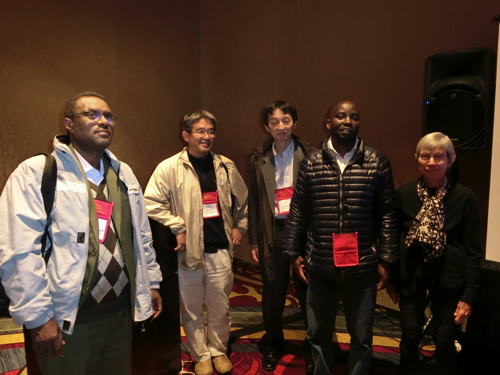
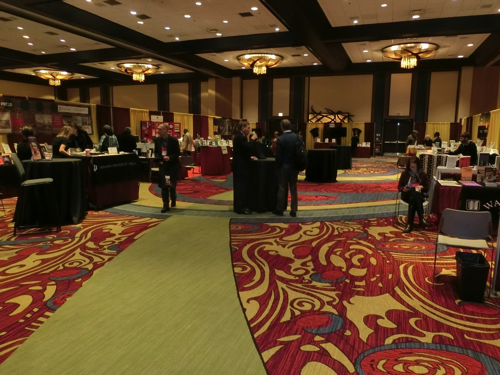

[Seminar on African Potentials] 1st Seminar on African Potentials (March 3, 2018)
Date: March 3, 2018. 14:00-16:00
Venue: Inamori Foundation Memorial Bldg, Middle-sized Meeting Room, Kyoto University
Program
14:05-14:40
Title: Camps for Political Prisoners in Guinea -The Current Situation and the Prospects for Bury the History
Speaker: Ichijo Hiroaki (Ryukoku University)
14:40-15:25
Title: Child-Rearing and Family Network among the Herero people in Namibia
Speaker: Yumi Kamuro (Kumamoto University)
15:25-16:00
Title: Publishing of Books for Children and African Literature: The Production of Literature and Writers in Francophone Western Africa
Speaker: Haruse Murata
[Research Team Meeting] 5th Meeting Development and Livelihood Research Team (January 27, 2018)
Date: January 27, 2018 11:30-14:00
Venue: 3rd floor of Inamori Foundation Memorial Hall, Kyoto University
Title: Food Security Policy and Pastoral Societies in Ethiopia
Speaker: Toru SAGAWA (Keio University)
[Research Team Meeting] 6th Meeting Language and Literature Research Team (January 27, 2018)
Date: January 27, 2018 11:30-14:30
Venue: 3rd floor of Inamori Foundation Memorial Hall, Kyoto University
Speaker: Haruse Murata
Title:The reason why books for African children are necessary : Considerations of interviews to writers and illustrators in London and Dakar
Brainstorming with members

